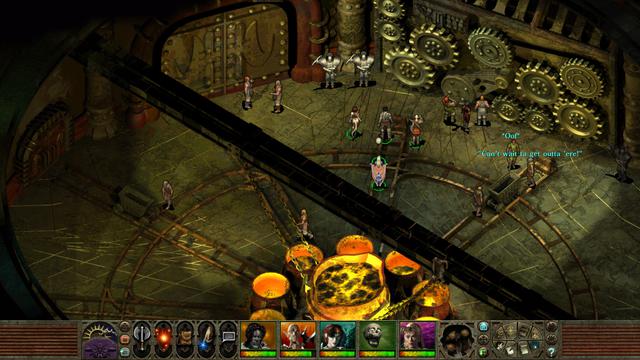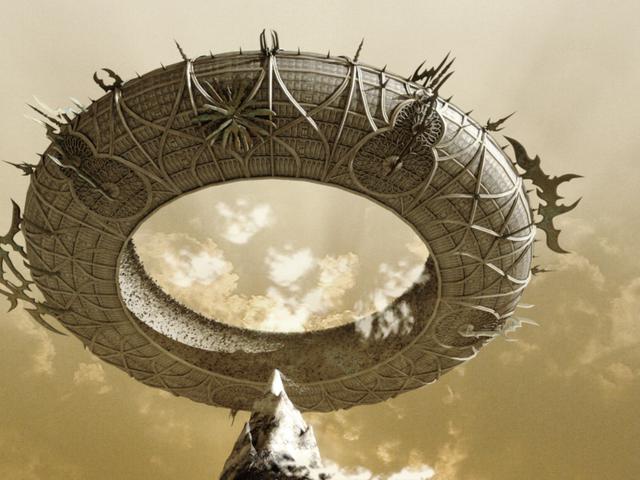

Planescape Torment... I mean...wow! There's a reason why it tops so many lists as the best computer role playing game ever. It's almost 20 years since it was released and people are still talking about it. The epic story, the great writing, the detailed NPCs, the original and wierd setting. There's a lot to like. One of my favourite reviews of Planescape Torment is this video by Noah Gervais. His stuff is low-fi but very well thought out - much like the game itself. If you aren't familar with the game, go and play it! Noah's video is full of spoilers, but all his videos are brilliant! I'll give a brief, spoiler free, description here, but what I really want to delve into is how it is almost the opposite of today's gaming culture and why we really want more of this sort of thing (at least in my opinion).
To borrow Noah's idea here, Torment is like the movie Citizen Kane. It's old and everyone can't shut-up about it, and when you are young, you don't listen to your elders and you go off and play Battlefield or something. I remember a good friend of mine (who was older) saying I should play it because it was awesome and I never did. It looked wierd, it wasn't a shooter or a 3D roleplay game and of course I knew what was best. Eventually though, when you get older, you might go "ah, everyone is talking about that old movie - let's watch it. I've got some time". And you do, and you realise why everyone thinks it's great! Torment is really old and it was hard to get working, but these lovely folks at Beamdog ported and fixed many of the bugs and now you can play it on many systems. I bought it for my Android Tablet and it's the only game on that device I've ever completed. It's great fun on a tablet actually. It took me many months to get through it, but having it on a portable device really helps.

The story unfolds in the Planescape setting of the Dungeons and Dragons universe. You play through the story of The Nameless One - the game's protagonist. Like Baldur's Gate it is roughly isometric, there is combat, leveling and dialogue, but that's about it for similarities. I'm going to list the ways that Torment turns almost every roleplay game trope on it's head:
Torment's story is it's greatest strength. You aren't playing this your way or altering the story. You are more like an active spectator in The Nameless One's story. The choices you make in many dialogs don't change the game outcomes in a structural way. It's more that the questions it asks of you will reveal things about you as a person. This game will either make you cry, feel sorrow or ultimately, the melancholy happiness of real forgiveness. It makes you feel a complicated, negative, and real emotion.
In actuality, this game plays you.

What does this have to do with Adam Curtis you ask? If you aren't familiar with Mr Curtis' work, check out the documentary All watched over by machines of loving grace. It's fantastic and a real insight into Silicon Valley and the views of our present age. His big thing is power and how it moves and shapes our world. I could talk a hell of a lot about Adam Curtis but this blog has a technology and arts focus so let's save that for later.
I came across an interview with him, by Adam Buxton. It's a very good listen and I encourage you all to give it a go. In it, he talks about Brexit, America and the problems of the day and suggests that one of the reasons we got here is our obsession with individualism. He posits that we've lost collectivism and surrendering ourselves to a higher ideal, belief or way of living. He talks about love being a form of surrender - that the self is given over to something. It's a powerful argument.
He goes on to talk about the culture and how he doesn't seem any form of collectivism in it. He mentions Punchdrunk and a performance he helped them with. I believe it's the same one I went to. A sort of choose your own theatre. You put on a mask and wander around large warehouse, full of set pieces being acted out. You experience the show your way. Your truth is the one that matters the most. Mr Curtis goes on to mention that while this is very interesting, it is almost impossible to get across your idea and vision (and by implication, truth).
Let's bring it back to gaming. We've seen the rise of walking simulators - a term that is too often used to batter poor developers and fan's of these games into submission (which is not nice - don't do it!). I personally believe some pieces of digital entertainment do fall into this trap due to lack of meaningful interaction. There are some folks who might even suggest Planescape Torment falls into this category: the combat and game elements are based on D&D 2nd edition and are therefore incomprehensible. Everything is story and text driven and it wants you to feel a grown-up, pesky emotion like all these indie-games! Eeeeuuuuwww!
Thing is, I see walking simulators and their more involved cousins trying to get back to something more important. Look at Battlefield, Call of Duty and the latest Fallout 76. Each one has claims to being epic, dramatic and over-the-top, and at the same time, super serious - yet you can still have your own paint job on your gun. You can dress your character however you want, make them as pretty as you want. You can build the world your way... In so doing any serious message the game wanted to tell was lost. Any emotion it wanted your to feel falls away. When Call of Duty started out, you were one soldier of many. You fought and you died and when you respawned, it was as someone else. In some doing, the horror of war could be palpably felt. These days, everyone is a super-mega-awesome-shooty-guy and it somehow doesn't seem very fulfilling (except for Doom but that's another blog post! :D ). Games these days put you in the centre of the most dramatic, over-the-top situations. How is anyone supposed to relate to that? Sure, power fantasies are great escapism but is that all that we want from the big names? Any remember the Amiga game Cannon Fodder? Now there was a game that knew all about war and war-games and made you care.
I think gaming is suffering from exactly this sort of individualism that Adam Curtis talks about, and when games focus on what they want to tell and ask you to come along with them there's a much greater chance to feel something deeper. The rise of the indie-game scene, I feel, is a counteraction to the bland, slickly produced, Triple A fayre we've been served, and it's doing it through not putting the player first (although there are a lot of melancholy platformers out there! :P). Gaming is culture and I think we are seeing a culture shift towards something different. I think it'll be an exciting time ahead. Using game mechanics actively to question the player, to make them think about your message, or feel the emotion you wanted is a real art and an incredible thing when done right.
But let's not forget, Planescape Torment did this in 1999. You should totally go and play it!
